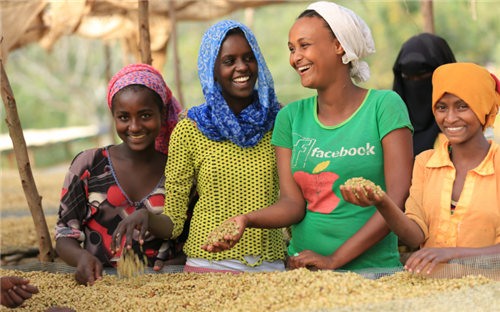Gender inequality in coffee picking and bean processing in Ethiopian coffee producing areas
Professional coffee knowledge exchange more coffee bean information please follow the coffee workshop (Wechat official account cafe_style)
The U.S. Department of Labor and the multinational non-profit organization (CARE) have signed a $5 million cooperation agreement funded by the U.S. International Labor Office (ILAB) for a period of 50 months. The cooperation project aims to focus on gender equality, improve gender inequality in the coffee industry in Ethiopia and reduce the employment of child labour.

The U.S. International Labour Office (ILAB) says the project will work with several Ethiopian government agencies to provide direct assistance to 10 towns in the coffee-growing areas of Gedeo and Oromia in southern Ethiopia, changing community and social norms and traditions and safeguarding gender inequality in the coffee industry, benefiting 10300 people.
According to statistics from the Ethiopian National Bureau of Statistics, compared with other coffee producing areas in Ethiopia, women (as well as child labourers) in the two coffee producing areas of Kiddio and Eromi have a very serious imbalance between labor and income, with more than 7,000 out of more than 10,000 people.

Child labor has become commonplace on small-scale coffee farms in Ethiopia. Because of regional poverty and lack of educational resources, children are naturally one of the burdens of families. Compared with adults, the labor force is not high, but the cost of employment can be very low.
The employment of child labour is very serious in almost all coffee-producing countries, and although the situation in Ethiopia is not optimistic, it does not reach the Verite (international non-profit organization mainly engaged in corporate social responsibility review, training and management system development) to maintain coffee production through forced labour and excessive employment of child labor. The United States International Labour Office (ILAB) also did not identify Ethiopia as a place with excessive child labor in the coffee industry, but the project followed up a large number of reports of discrepancies in child labor employment records.

The project increasing Labour Employment in low-income countries, funded by the UK's Department for International Development (UKAID), pointed out in a recent report that if Ethiopia's coffee labour force was surveyed and recorded by men, then the actual proportion of women and child labour in Ethiopia's coffee labor would have a difference of 7 per cent and 10 per cent.
For more boutique coffee beans, please add private Qianjie coffee on Wechat. WeChat account: kaixinguoguo0925
Important Notice :
前街咖啡 FrontStreet Coffee has moved to new addredd:
FrontStreet Coffee Address: 315,Donghua East Road,GuangZhou
Tel:020 38364473
- Prev

OATLY Coffee Master Oat Milk develops Oat Milk Why should OATLY own more than 10, 000 cafes
On March 9, OATLY, the world's largest Swedish oatmeal brand, released the latest news: plans to build a new factory! According to the official website of oatmeal brand OATLY, the first factory will be built in the UK. The newly established factory will become one of the largest plant-based dairy factories in the world, with an annual production capacity of 300 million litres of oatmeal, which could grow to 4. 5 percent, according to the snack generation.
- Next

Is it expensive for McDonald's to launch a sun latte? Is it good? What is McDonald's exchanging pills for pills?
McDonald's has never been hot in the appearance of its products, from the lack of complaints to the meat-filled bun, to the addition of a poached egg to an ordinary latte, which has successfully made the latte a popular style. It seems that ginger is still old and spicy. Coffee with poached eggs? Can I drink this? It can't be a dark dish! Most netizens said they were very curious about this poached egg latte. So McDonald's
Related
- What is the difference between Indonesian Sumatra Mantinin coffee and gold Mantinin? How to distinguish between real and fake golden Mantelin coffee?
- What does bypass mean in coffee? Why can hand-brewed coffee and water make it better?
- Unexpected! Ruixing Telunsu lattes use a smoothie machine to foam milk?!
- % Arabia's first store in Henan opens into the village?! Netizen: Thought it was P's
- Does an authentic standard mocha coffee recipe use chocolate sauce or powder? Mocha Latte/Dirty Coffee/Salty Mocha Coffee Recipe Share!
- What is the difference between Vietnam egg coffee and Norway egg coffee? Hand-brewed single product coffee filter paper filter cloth filter flat solution!
- What is the difference between sun-cured and honey-treated coffee? What are the differences in the flavor characteristics of sun-honey coffee?
- How to make Italian latte! How much milk does a standard latte use/what should the ratio of coffee to milk be?
- How to make butter American/butter latte/butter Dirty coffee? Is hand-brewed coffee good with butter?
- Is Dirty the cold version of Australian White? What is the difference between dirty coffee/decent coffee and Australian white espresso?

